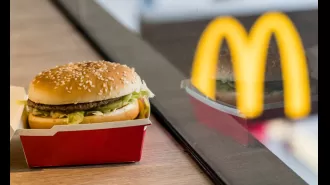A mistrial has been declared in the case against Karen Read, who is accused of killing her husband.
A woman was acquitted when the jury couldn't reach a decision, leaving her husband's death unsolved.
July 1st 2024.

The courtroom was tense as the judge declared a mistrial in the case of Karen Read. After days of deliberation, the jurors were unable to reach a unanimous decision. The case had captured the attention of many, from true crime enthusiasts to conspiracy theorists, and even garnered support from Read's pink-shirted followers.
The prosecution stated that they intended to retry the case, leaving both sides to prepare for round two. Read, a former professor at Bentley College, was facing second-degree murder and other charges for the death of her boyfriend, Boston police officer John O'Keefe. O'Keefe's body was found outside the home of another Boston police officer, and an autopsy revealed he died from hypothermia and blunt force trauma.
The prosecution's case revolved around the theory that Read had hit O'Keefe with her SUV and then drove away, leaving him in the snowstorm. However, the defense painted a different picture, portraying Read as the victim and claiming that O'Keefe was actually killed inside the home of his fellow officer, Brian Albert. They argued that investigators had unfairly targeted Read, using her as a convenient scapegoat to avoid considering other suspects, including Albert and other law enforcement officers at the party.
Despite the judge's encouragement to keep trying, the jurors were at an impasse. They expressed their belief that further deliberation would be futile in a note read by the judge. O'Keefe's mother was overcome with emotion, while Read hugged her family, relieved that the trial was over, at least for now.
The district attorney's office released a statement, thanking the O'Keefe family for their commitment to finding justice for their loved one and confirming their intention to retry the case. Defense attorney Alan Jackson promised to continue fighting for Read, asserting that the prosecution had failed miserably.
The trial had been full of drama, with testimony focusing on shoddy police work and the relationships between the parties involved. Police admitted to using red plastic cups to collect blood evidence and even using a leaf blower to clear away snow in search of evidence. The lead investigator also made crude statements about Read in personal texts, causing doubt to be cast on the investigation.
Expert witnesses provided conflicting opinions on whether O'Keefe's injuries were consistent with being hit by Read's SUV. The defense argued that the injuries were caused by an altercation and the aggressive dog owned by the Albert family. Meanwhile, Read's supporters, dressed in pink, gathered outside the courtroom each day, rallying behind her and showing their support.
Despite the mistrial, Read's legal team remained determined to prove her innocence. They pointed out flaws in the police investigation, such as the fact that Albert's home was never searched for evidence and the crime scene was not properly secured. They also suggested that some of the evidence, such as a broken drinking glass and a strand of hair, may have been planted by the police.
One of the most significant moments in the trial was when lead investigator State Trooper Michael Proctor took the stand. He admitted to sending offensive texts about Read during the investigation but claimed that they had no influence on the case. However, the defense used this information to cast doubt on the validity of the investigation.
As the trial came to an end, two expert witnesses hired by the US Department of Justice testified for the defense, providing a scientific analysis that contradicted the prosecution's theory. They stated that O'Keefe's injuries and the physical evidence did not align with the idea that he was struck by Read's 7,000-pound vehicle.
The mistrial was a setback, but both sides were gearing up for the next round. The supporters of Read remained hopeful, while the prosecution was determined to find justice for O'Keefe. The trial may have ended, but the fight for the truth was far from over.
The prosecution stated that they intended to retry the case, leaving both sides to prepare for round two. Read, a former professor at Bentley College, was facing second-degree murder and other charges for the death of her boyfriend, Boston police officer John O'Keefe. O'Keefe's body was found outside the home of another Boston police officer, and an autopsy revealed he died from hypothermia and blunt force trauma.
The prosecution's case revolved around the theory that Read had hit O'Keefe with her SUV and then drove away, leaving him in the snowstorm. However, the defense painted a different picture, portraying Read as the victim and claiming that O'Keefe was actually killed inside the home of his fellow officer, Brian Albert. They argued that investigators had unfairly targeted Read, using her as a convenient scapegoat to avoid considering other suspects, including Albert and other law enforcement officers at the party.
Despite the judge's encouragement to keep trying, the jurors were at an impasse. They expressed their belief that further deliberation would be futile in a note read by the judge. O'Keefe's mother was overcome with emotion, while Read hugged her family, relieved that the trial was over, at least for now.
The district attorney's office released a statement, thanking the O'Keefe family for their commitment to finding justice for their loved one and confirming their intention to retry the case. Defense attorney Alan Jackson promised to continue fighting for Read, asserting that the prosecution had failed miserably.
The trial had been full of drama, with testimony focusing on shoddy police work and the relationships between the parties involved. Police admitted to using red plastic cups to collect blood evidence and even using a leaf blower to clear away snow in search of evidence. The lead investigator also made crude statements about Read in personal texts, causing doubt to be cast on the investigation.
Expert witnesses provided conflicting opinions on whether O'Keefe's injuries were consistent with being hit by Read's SUV. The defense argued that the injuries were caused by an altercation and the aggressive dog owned by the Albert family. Meanwhile, Read's supporters, dressed in pink, gathered outside the courtroom each day, rallying behind her and showing their support.
Despite the mistrial, Read's legal team remained determined to prove her innocence. They pointed out flaws in the police investigation, such as the fact that Albert's home was never searched for evidence and the crime scene was not properly secured. They also suggested that some of the evidence, such as a broken drinking glass and a strand of hair, may have been planted by the police.
One of the most significant moments in the trial was when lead investigator State Trooper Michael Proctor took the stand. He admitted to sending offensive texts about Read during the investigation but claimed that they had no influence on the case. However, the defense used this information to cast doubt on the validity of the investigation.
As the trial came to an end, two expert witnesses hired by the US Department of Justice testified for the defense, providing a scientific analysis that contradicted the prosecution's theory. They stated that O'Keefe's injuries and the physical evidence did not align with the idea that he was struck by Read's 7,000-pound vehicle.
The mistrial was a setback, but both sides were gearing up for the next round. The supporters of Read remained hopeful, while the prosecution was determined to find justice for O'Keefe. The trial may have ended, but the fight for the truth was far from over.
[This article has been trending online recently and has been generated with AI. Your feed is customized.]
[Generative AI is experimental.]
0
0
Submit Comment




